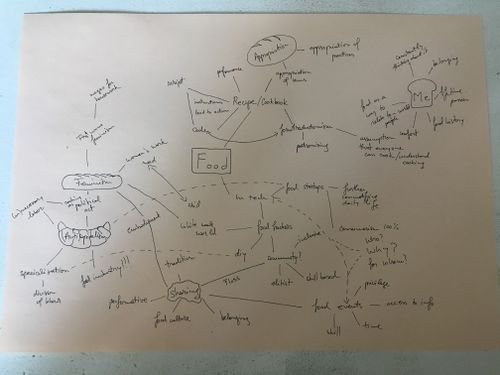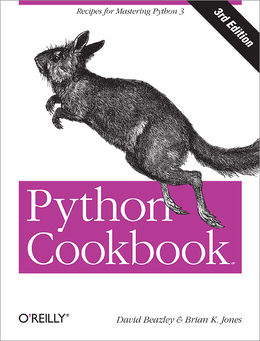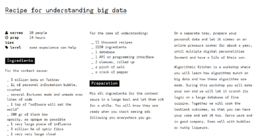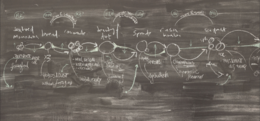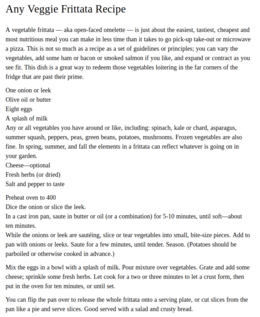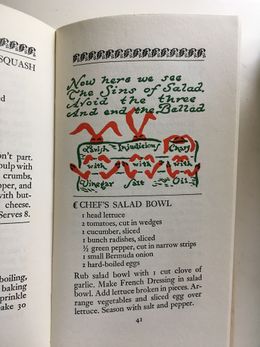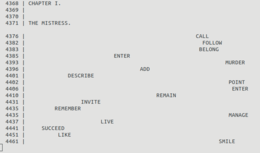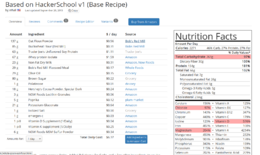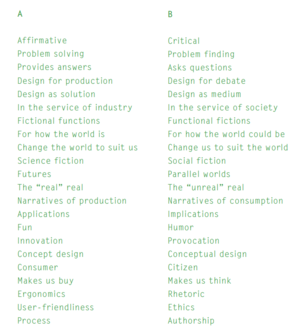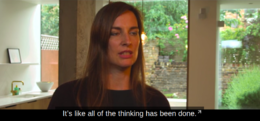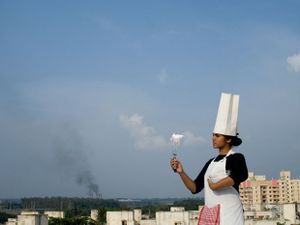User:Alice/Grad ideas: Difference between revisions
No edit summary |
No edit summary |
||
| (9 intermediate revisions by the same user not shown) | |||
| Line 1: | Line 1: | ||
I'm going to go crazy here and write down all the bullshit I've been considering regarding this thesis/project, alongside all the food things that occupy my | I'm going to go crazy here and write down all the bullshit I've been considering regarding this thesis/project, alongside all the food things that occupy my brain | ||
=Mind map= | =Mind map= | ||
| Line 39: | Line 39: | ||
File:Holiday.jpg|Or this one | File:Holiday.jpg|Or this one | ||
File:Commander2.png|Commands | File:Commander2.png|Commands | ||
File: | File:Recipe_bachelor.png | ||
</gallery> | </gallery> | ||
| Line 50: | Line 49: | ||
On the 25th of October, I briefly took part in a [https://www.creativecodingutrecht.nl/2018/09/11/designing-recipes-for-sustainable-digital-food-futures/ workshop] organized by Creative Code Utrecht, hosted by Marketa Dolejsova, in a restaurant/meeting room space called The Green House. due to personal issues, I was only able to participate for the initial presentations. However, I got a good sense of what the participants backgrounds and interest were. | On the 25th of October, I briefly took part in a [https://www.creativecodingutrecht.nl/2018/09/11/designing-recipes-for-sustainable-digital-food-futures/ workshop] organized by Creative Code Utrecht, hosted by Marketa Dolejsova, in a restaurant/meeting room space called The Green House. due to personal issues, I was only able to participate for the initial presentations. However, I got a good sense of what the participants backgrounds and interest were. | ||
My notes are [https://pad.xpub.nl/p/food_futures here.] | My notes are [https://pad.xpub.nl/p/food_futures here.] | ||
One thing that struck me was the range of participants this kind of workshop attracted, including the speakers who did small presentations at the beginning. Being a food-related workshop, ran by someone who dedicated her PhD to the concept of designing future food scenarios using [http://readings.design/PDF/speculative-everything.pdf speculative design] as a method. | One thing that struck me was the range of participants this kind of workshop attracted, including the speakers who did small presentations at the beginning. Being a food-related workshop, ran by someone who dedicated her PhD to the concept of designing future food scenarios using [http://readings.design/PDF/speculative-everything.pdf speculative design] as a method, I was expecting to see more people interested in social, grassroots approaches to food, interested in a critical approach to the use of technology. Instead, I was surprised to find myself surrounded by entrepreneurs and designers fully embraced not only tech that used highly personal data with no claim to privacy for the purpose of personalized nutrition advice, but also dedicated a big part of their life to moving their whole being into the 'future' bu replacing all meals with highly processed food-like substances in liquid form. | ||
[[File:Speculative.png|thumbnail]] | |||
=Meal replacements= | |||
I've been doing quite a bit of research into the notion of meal replacements. In particular, I've been looking at the development and rise of Soylent, and it's European equivalent Huel. The first one was developed in Silicon Valley by a couple of computer scientists who were looking for their breakthrough in the startup world. They were all young white males with no experience with cooking, who were allegedly surviving on frozen pizza and several similar fast food products, and were frustrated by the quality of their meals and the time they took away from their day. Taking the approach of an engineer to this situation that they saw as a problem, they came to the conclusion that feeding yourself is very inefficient, that food is not the best way to transfer the necessary nutrients for the survival of the body, and that the best way to go about this is by reducing food to its most basic elements and ingesting it in that form. In their view, this could represent the ultimate life hack, as they allow them to further release themselves from their human bodily needs and exist purely for the purpose of being efficient for capitalist purposes. In this way, the only food preparation that is necessary on a daily basis is reduced minimum, mixing powder with water, and the time previously spent doing time-consuming activities such as eating actual food is reduced to a couple of seconds’ worth of gulping down beige mush from a plastic container. | |||
A surprising twist that I have noticed within the community of meal replacement enthusiasts is the desire to get involved in the process of ‘cooking’ their meals. For instance, the website completefoods.co is a place where the complete food enthusiasts post their recipes and have discussions related to diy versions of meal replacements. You also have the possibility to place an order straight to Amazon for the ingredients, to customise the recipes according to your specific needs down to a single gram, or even source your food from a supermarket, which I assume is their version of reconnecting humans with the source of their food. | |||
Another aspect of this is the fact that certain brands such as Huel (human fuel) offer recipe ideas on their website, in which you can use Huel as an ingredient for baking ‘healthy, guilt-free’ cookies and brownies. This is reminiscent of the method used by the brand Betty Crocker in the 50s or 60s, when they first introduced cake mixes on the market and they realised that housewives felt less guilty for cheating and using pre-made mixes if the recipe required them to add an egg. | |||
One obvious reference that comes to mind here is the Entreprecariat project of Silvio Lorusso, including the notion of life-hacks meant to make humans more efficient and waste less time on catering to their human bodies and their needs. | |||
<gallery widths=260px heights=460px> | |||
File:Soylent2.png | |||
File:Thinking_food.png | |||
</gallery> | |||
=On the brink of a crucial development= | |||
Inspired by the book 'In the age of the smart machine' by Shoshana Zuboff, I think it is interesting to look at the meal replacement phenomenon as potentially similar to the computerization of the workplace. What id it does become the future of food? What can we learn today, on the possible brink of a crucial development, by people who are excited by this, neutral or completely against. | |||
=Inspiration= | =Inspiration= | ||
| Line 60: | Line 77: | ||
[http://materie.me/projects Marketa's projects, in general] | [http://materie.me/projects Marketa's projects, in general] | ||
Smog tasting | |||
[[File:Smog tasting.jpg|frameless|right|Project by The Center for Genomic Gastronomy]] | |||
<gallery> | |||
File:Zine_food1.jpg|Life recipe | |||
File:Zine_food2.jpg|Life recipe 2 | |||
File:Zine_food3.jpg|Life recipe 3 | |||
</gallery> | |||
Latest revision as of 11:14, 8 January 2019
I'm going to go crazy here and write down all the bullshit I've been considering regarding this thesis/project, alongside all the food things that occupy my brain
Mind map
Thought
Cooking practices have been appropriated and taken over by tech culture. Food workshop, 'food hacking' have found their way into hackerspaces around the world. What is gained and what is lost by this hijacking? Why has software culture adopted terms such as 'cookbook', 'recipe', 'kitchen' into its practices of writing, collecting and experimenting with software? How can open-source free software culture practices be adopted and adapted to food culture? Is cooking an elitist practice?
Foodcritic is a linter and code standard enforcer for Chef cookbooks.
Foodcritic is a static analysis tool, meaning that it examines the code without executing it.
Foodcritic can find a wide range of issues, including formatting, deviation from best practices, and subtle bugs.
Another thought
How can we reflect on cooking as an anti-capitalist action? Our time has been carefully structured so that we can spend as much time as possible being productive, as in producing capital and goods. Cooking is considered extra labour that we do not need to perform. Corporations have made it clear that cooking is something that they can provide, so that we can be simply consumers. Our free time should only be spend on leisure activities/entertainment, otherwise known as even more consumption.
Recipes
Women's place
Imagining food futures workshop
On the 25th of October, I briefly took part in a workshop organized by Creative Code Utrecht, hosted by Marketa Dolejsova, in a restaurant/meeting room space called The Green House. due to personal issues, I was only able to participate for the initial presentations. However, I got a good sense of what the participants backgrounds and interest were. My notes are here. One thing that struck me was the range of participants this kind of workshop attracted, including the speakers who did small presentations at the beginning. Being a food-related workshop, ran by someone who dedicated her PhD to the concept of designing future food scenarios using speculative design as a method, I was expecting to see more people interested in social, grassroots approaches to food, interested in a critical approach to the use of technology. Instead, I was surprised to find myself surrounded by entrepreneurs and designers fully embraced not only tech that used highly personal data with no claim to privacy for the purpose of personalized nutrition advice, but also dedicated a big part of their life to moving their whole being into the 'future' bu replacing all meals with highly processed food-like substances in liquid form.
Meal replacements
I've been doing quite a bit of research into the notion of meal replacements. In particular, I've been looking at the development and rise of Soylent, and it's European equivalent Huel. The first one was developed in Silicon Valley by a couple of computer scientists who were looking for their breakthrough in the startup world. They were all young white males with no experience with cooking, who were allegedly surviving on frozen pizza and several similar fast food products, and were frustrated by the quality of their meals and the time they took away from their day. Taking the approach of an engineer to this situation that they saw as a problem, they came to the conclusion that feeding yourself is very inefficient, that food is not the best way to transfer the necessary nutrients for the survival of the body, and that the best way to go about this is by reducing food to its most basic elements and ingesting it in that form. In their view, this could represent the ultimate life hack, as they allow them to further release themselves from their human bodily needs and exist purely for the purpose of being efficient for capitalist purposes. In this way, the only food preparation that is necessary on a daily basis is reduced minimum, mixing powder with water, and the time previously spent doing time-consuming activities such as eating actual food is reduced to a couple of seconds’ worth of gulping down beige mush from a plastic container.
A surprising twist that I have noticed within the community of meal replacement enthusiasts is the desire to get involved in the process of ‘cooking’ their meals. For instance, the website completefoods.co is a place where the complete food enthusiasts post their recipes and have discussions related to diy versions of meal replacements. You also have the possibility to place an order straight to Amazon for the ingredients, to customise the recipes according to your specific needs down to a single gram, or even source your food from a supermarket, which I assume is their version of reconnecting humans with the source of their food. Another aspect of this is the fact that certain brands such as Huel (human fuel) offer recipe ideas on their website, in which you can use Huel as an ingredient for baking ‘healthy, guilt-free’ cookies and brownies. This is reminiscent of the method used by the brand Betty Crocker in the 50s or 60s, when they first introduced cake mixes on the market and they realised that housewives felt less guilty for cheating and using pre-made mixes if the recipe required them to add an egg.
One obvious reference that comes to mind here is the Entreprecariat project of Silvio Lorusso, including the notion of life-hacks meant to make humans more efficient and waste less time on catering to their human bodies and their needs.
On the brink of a crucial development
Inspired by the book 'In the age of the smart machine' by Shoshana Zuboff, I think it is interesting to look at the meal replacement phenomenon as potentially similar to the computerization of the workplace. What id it does become the future of food? What can we learn today, on the possible brink of a crucial development, by people who are excited by this, neutral or completely against.
Inspiration
Project by Constant, an experiment with collaborative cooking
Marketa's projects, in general
Smog tasting

